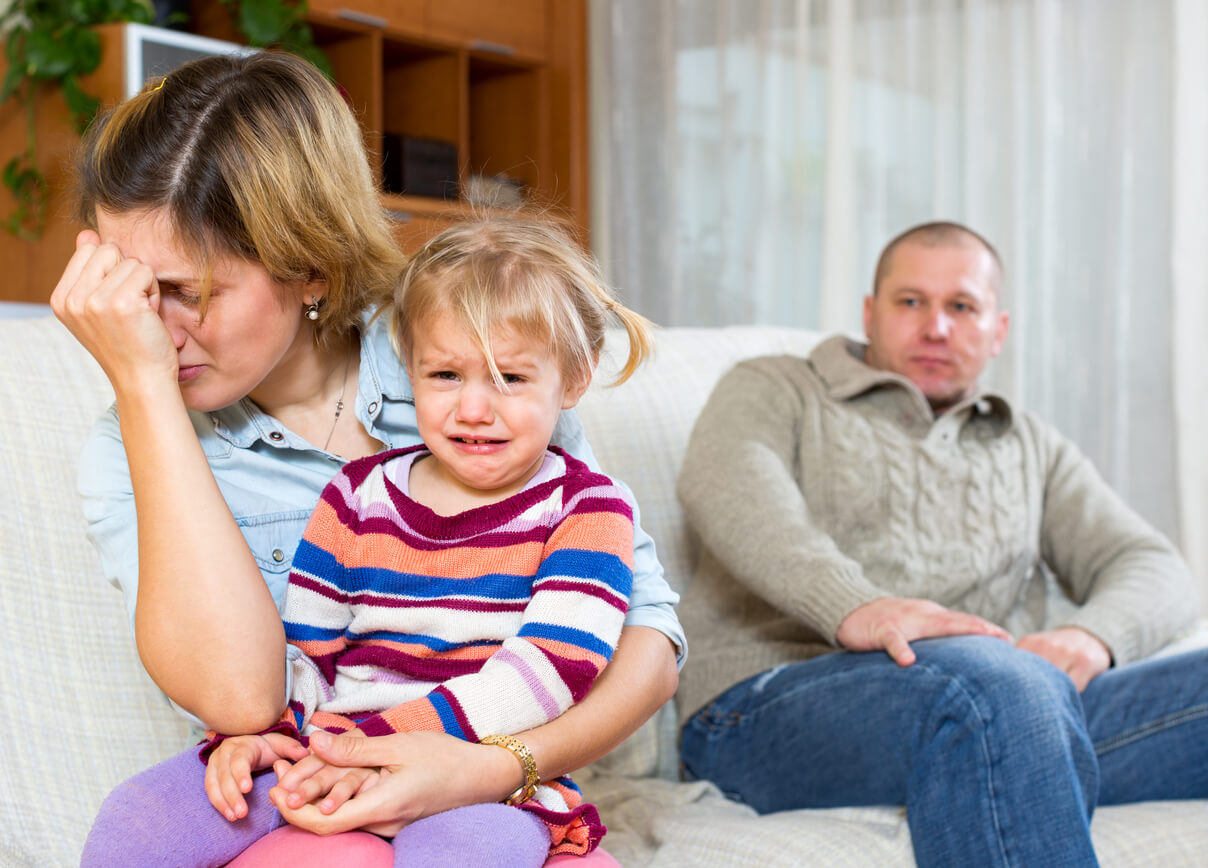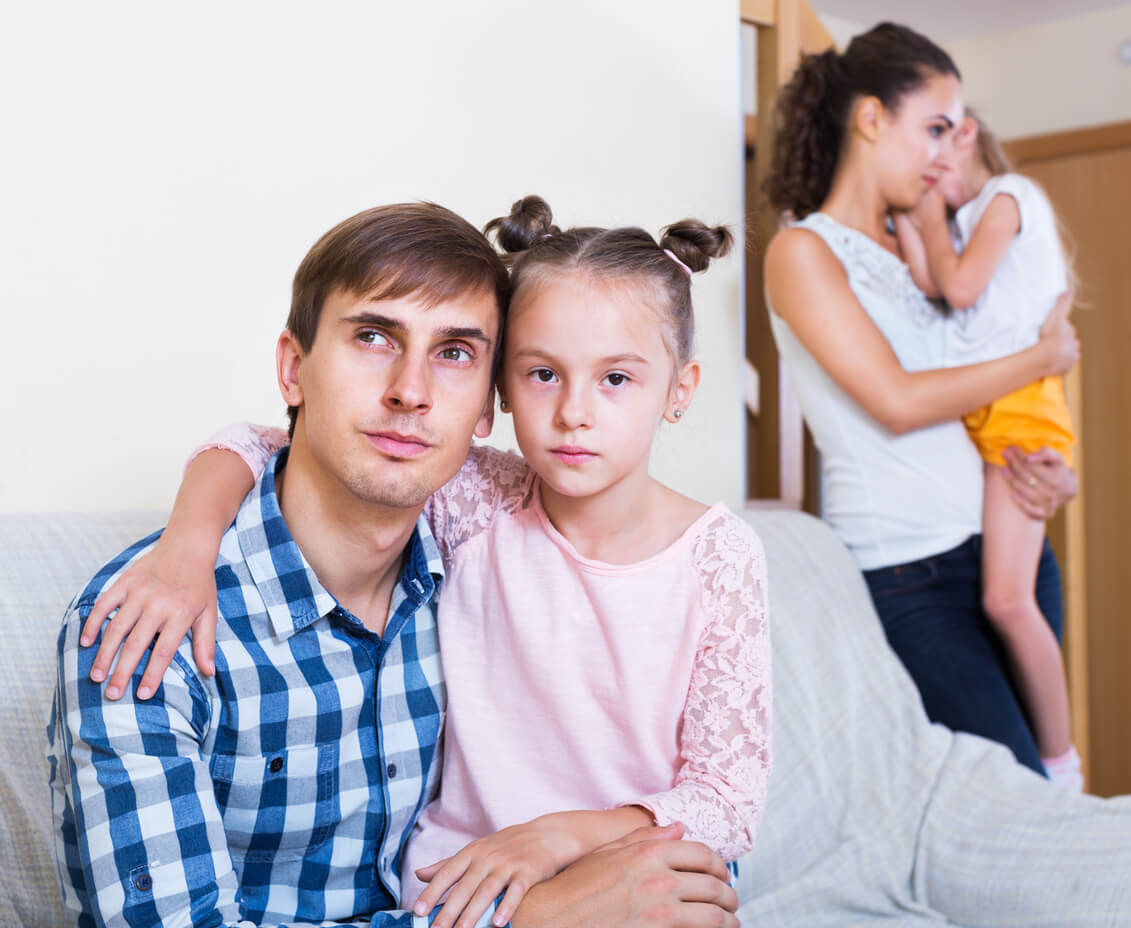The Consequences of a Contentious Divorce


Written and verified by the psychologist Mara Amor López
When a couple decides to separate, they may do so by mutual agreement or, on the contrary, in a very bad way. We must be clear that any breakup will produce suffering in children, but even more so when it’s a contentious divorce. Parents have the duty to protect their children and create safe environments for them, so being transparent and keeping the children away from conflicts will be crucial during the process.
Children suffer, especially emotionally, from seeing how their reference figures, whom they trust, have lost respect for one another and use them as a weapon to blackmail one another. This damage produced will accompany them for life if it’s not treated or avoided. A child who’s forced to choose between father or mother is no longer a child, as their childhood, security, and the love of their family have been broken.
The damage of a contentious divorce
Separations are often painful, but in addition, if you have children, the suffering and damage to them are considerable. When a couple involves children in conflicts, it causes them pain and anguish. Sometimes they do so out of ignorance, but at other times, it’s out of spite or in the search for personal satisfaction. In these cases, they forget the damage they can cause to their children.
The serious thing about all this is that the children end up being the weapon used by both parents to harm one another. Therefore, the children can’t see one of their parents for years or they have to split up and put on one face with their father and another face with their mother. There are even children who can’t tell one of their parents that they had a great weekend with the other parent.

The consequences of a contentious divorce on children
Many times, parents are unaware of the damage they’re doing to their children with these attitudes. Often, children are forced to choose or take sides with one parent or the other. However, these circumstances generate a loyalty conflict in the child that ends up damaging their emotional and psychological stability. Many adults use emotional blackmail with their children and cause serious consequences, such as the following:
- Emotional instability in the child. The child doesn’t understand how the person who’s supposed to love and protect them causes them to suffer.
- Somatizations. Children may present headaches or tummy aches, vomiting, feeling sick, irritability, behavioral problems, feelings of guilt, decreased academic performance, social withdrawal, or sleeping problems, among others.
- Anxious or depressive symptoms. These usually appear in the long term. In addition, there may be self-esteem problems.
- Problems in the way they build their relationships. As they grow up, some may learn to relate through deception, manipulation, or blackmail. Others may establish relationships based on dysfunctional models, where feelings of abandonment, insecurity, mistrust, and fear of rejection arise.
Given all these symptoms and problems caused in the child, the intervention of a psychologist becomes necessary in order to address, treat, and guide the family in regard to all these problems. It’s important to work on the distortions about relationships and their affections and somatizations, among others.
What should the parents do?
Before the separation, it’s important to take into account the suggestions that we’ll offer you below.
Prioritize the well-being of the children
Before a separation, you always need to give priority to not harming your children and taking care of their well-being. Children, after the divorce, will have to adapt to a new situation that’s totally foreign to them.

Have a cordial relationship
It’s very important that both parents have a cordial relationship, especially for the sake of their children. Children observe everything and, if they witness accusations, criticism, and aggressive language between their parents, they’ll receive a wrong message about what relationships should be. For a child to know how to build healthy relationships, parents should be their example and always keep them away from conflicts.
Establish routines with both parents equally
In the case of shared custody, the aim of the parents should be to provide the greatest security and stability to their children so that they can adapt to the new situation. It’s important to establish daily routines (educational guidelines, schedules, and homework, among others), with both parents equally, in order to maintain the same environment and education.
Children are the main victims when it comes to a contentious divorce
Separations are always painful, but when we’re faced with a contentious divorce, those who suffer most are the children. This type of separation causes emotional and psychological consequences that can affect them in the present and also in the future. For this reason, when parents decide to separate, they always have to use their heads, make healthy decisions, and think about what’s best for their children.
It’s key to always try to make sure that children don’t feel abandoned by their parents. Also, they should know that they have more family members who will always be with them, regardless of the fact that their parents aren’t together. Their future will depend on how we take care of their mental health with the decisions we make now.
When a couple decides to separate, they may do so by mutual agreement or, on the contrary, in a very bad way. We must be clear that any breakup will produce suffering in children, but even more so when it’s a contentious divorce. Parents have the duty to protect their children and create safe environments for them, so being transparent and keeping the children away from conflicts will be crucial during the process.
Children suffer, especially emotionally, from seeing how their reference figures, whom they trust, have lost respect for one another and use them as a weapon to blackmail one another. This damage produced will accompany them for life if it’s not treated or avoided. A child who’s forced to choose between father or mother is no longer a child, as their childhood, security, and the love of their family have been broken.
The damage of a contentious divorce
Separations are often painful, but in addition, if you have children, the suffering and damage to them are considerable. When a couple involves children in conflicts, it causes them pain and anguish. Sometimes they do so out of ignorance, but at other times, it’s out of spite or in the search for personal satisfaction. In these cases, they forget the damage they can cause to their children.
The serious thing about all this is that the children end up being the weapon used by both parents to harm one another. Therefore, the children can’t see one of their parents for years or they have to split up and put on one face with their father and another face with their mother. There are even children who can’t tell one of their parents that they had a great weekend with the other parent.

The consequences of a contentious divorce on children
Many times, parents are unaware of the damage they’re doing to their children with these attitudes. Often, children are forced to choose or take sides with one parent or the other. However, these circumstances generate a loyalty conflict in the child that ends up damaging their emotional and psychological stability. Many adults use emotional blackmail with their children and cause serious consequences, such as the following:
- Emotional instability in the child. The child doesn’t understand how the person who’s supposed to love and protect them causes them to suffer.
- Somatizations. Children may present headaches or tummy aches, vomiting, feeling sick, irritability, behavioral problems, feelings of guilt, decreased academic performance, social withdrawal, or sleeping problems, among others.
- Anxious or depressive symptoms. These usually appear in the long term. In addition, there may be self-esteem problems.
- Problems in the way they build their relationships. As they grow up, some may learn to relate through deception, manipulation, or blackmail. Others may establish relationships based on dysfunctional models, where feelings of abandonment, insecurity, mistrust, and fear of rejection arise.
Given all these symptoms and problems caused in the child, the intervention of a psychologist becomes necessary in order to address, treat, and guide the family in regard to all these problems. It’s important to work on the distortions about relationships and their affections and somatizations, among others.
What should the parents do?
Before the separation, it’s important to take into account the suggestions that we’ll offer you below.
Prioritize the well-being of the children
Before a separation, you always need to give priority to not harming your children and taking care of their well-being. Children, after the divorce, will have to adapt to a new situation that’s totally foreign to them.

Have a cordial relationship
It’s very important that both parents have a cordial relationship, especially for the sake of their children. Children observe everything and, if they witness accusations, criticism, and aggressive language between their parents, they’ll receive a wrong message about what relationships should be. For a child to know how to build healthy relationships, parents should be their example and always keep them away from conflicts.
Establish routines with both parents equally
In the case of shared custody, the aim of the parents should be to provide the greatest security and stability to their children so that they can adapt to the new situation. It’s important to establish daily routines (educational guidelines, schedules, and homework, among others), with both parents equally, in order to maintain the same environment and education.
Children are the main victims when it comes to a contentious divorce
Separations are always painful, but when we’re faced with a contentious divorce, those who suffer most are the children. This type of separation causes emotional and psychological consequences that can affect them in the present and also in the future. For this reason, when parents decide to separate, they always have to use their heads, make healthy decisions, and think about what’s best for their children.
It’s key to always try to make sure that children don’t feel abandoned by their parents. Also, they should know that they have more family members who will always be with them, regardless of the fact that their parents aren’t together. Their future will depend on how we take care of their mental health with the decisions we make now.
All cited sources were thoroughly reviewed by our team to ensure their quality, reliability, currency, and validity. The bibliography of this article was considered reliable and of academic or scientific accuracy.
- De la Cruz, A. C. (2008). Divorcio destructivo: cuando uno de los padres aleja activamente al otro de la vida de sus hijos. Diversitas: Perspectivas en psicología, 4(1), 149-157.
-
Cuervo, Á. A. V., Martínez, E. A. C., Murrieta, M. U., & Vázquez, B. G. I. (2011). Efectos del divorcio de los padres en el desempeño académico y la conducta de los hijos. Enseñanza e investigación en psicología, 16(2), 295-308.
-
Duarte, J. C., Arboleda, M. R. C., & Díaz, M. D. J. (2002). Las consecuencias del divorcio en los hijos. Psicopatología Clínica Legal y Forense, 2(3), 47-66.
-
Arrieta, M. J., Macías, M. A., & Amarís, M. V. (2012). Afrontamiento en crisis familiares: El caso del divorcio cuando se tienen hijos adolescentes. Salud Uninorte, 28(1), 99-112.
This text is provided for informational purposes only and does not replace consultation with a professional. If in doubt, consult your specialist.








